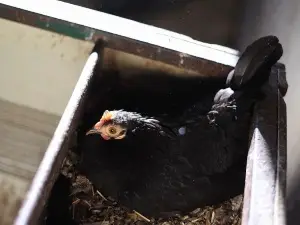
Taking care of broody hens can be a bit of a mission. Chickens who go broody are known to have a change in behavior.
Broodiness is contagious so you might find that you have multiple broody hens at one time, this article looks at what to do if this happens
Table of Contents
Multiple broody hens
Positives:
Co-parenting:
If multiple chickens go broody at the same time, and the birds have a nonaggressive and helpful relationship with each other, then these birds may co-parent the baby chicks after hatching.
The hens will teach the babies about eating and drinking. The families may also move into the same nest box, and travel around the yard together.
Tips:
If two birds share one nest box and seem to have a healthy relationship with each other, then you can let them be.
If there isn’t enough space, and two birds are incubating two sets of eggs, it’s common to see one bird brooding a clutch of eggs, and the other sitting on the hen that is sitting on the eggs.
This isn’t ideal and is a sign that a bigger nest is needed. You may have to build a bigger nest box for the birds, or find a bigger nest box for birds.
If the nest box is too small, and you don’t do anything about it, then some of the birds may get trampled on and die because of the limited space in the nest box.
When having multiple broodies can be dangerous:
Aggression:
Broody hens are more aggressive than non broody hens. These birds will not only be aggressive with you but they may also be aggressive with other birds in the flock as well, this extends to adult and baby birds.
If multiple birds become broody at once, and newly hatched baby chicks get too close to the broody hen, then the broody hen may peck at the chicks.
The occasional peck will not be dangerous to adult birds but pecking may cause some serious injuries to baby birds who are more fragile. In fact, some broody hens will peck a baby chick to death if it gets too close.
What to do:
Keep an eye on your broody hens and baby chicks. If you notice that some baby chicks are getting too close to an aggressive broody hen, then you’d need to keep the chicks away, or else they will get pecked.
You may need to isolate your broody hens into their own private broody hen suites. This will ensure that curious baby birds can’t access them and will make sure that the aggressive hens don’t start pecking at trespassers who get too close.
Stealing of eggs:
Some broody hens will get aggressive and steal eggs for themselves. If a bird feels that it doesn’t have enough eggs, the bird may steal another bird’s eggs.
A bird that has less than 10 eggs to sit on may start stealing the eggs of other birds.
A chicken that is about to go broody may go around collecting eggs to sit on. She may collect eggs from other birds, stealing them right out of another hen’s nest box.
She will tuck these eggs under her wing and keep them for herself, this will result in the loss of eggs of another bird, this is distressful to the other bird.
What to do:
If one bird is stealing eggs then you’d need to separate this bird from the rest of the broody hens, this will protect the other bird’s eggs from being stolen.
Conclusion:
In conclusion, while it is possible for multiple hens to be broody at the same time, and the likelihood of this happening is high because broodiness is contagious, allowing multiple birds to become broody all at once is not recommended.
Hens can sometimes brood together in harmony but in the same breath, brooding together may be disastrous for some of the broody hens, the baby birds, and eggs.
If you notice a negative change in some hens, then you may need to intervene.
If you enjoyed this article then you may also be interested in other chicken related articles. Here are some articles that you may be interested in: Can Chickens Drink Well Water?, Can Chickens Drink Chlorinated Water?, Chickens Pecking Each Other To Death, Bullied Chicken Not Eating, Broody Hen Eggs Not Hatching

